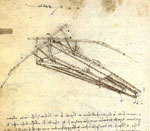

He is now appreciated
as having been a master painter, a sculptor, and architect, a musician,
an engineer and, well, something of a scientist.
The reverence for Leonardo's scientific and technological thinking dates
back to the Industrial Revolution. At that time his notebooks were
scattered all over Europe.
And now what we have is about 7,000 pages of notes. The man wrote about:
- astronomy
- anatomy
- ballistics
- botany
- eyes and light
- flight
- geology
- hydraulics
- and the possibilities
of bridges and highways
But look at the claims that are made on his behalf:
THAT he beat Newton to the theory of gravity
THAT he realised the sun was the centre of the solar system ahead of Copernicus
THAT he had mapped out the circulation of the blood before William Harvey.
THAT he had a more complete understanding of the principle of erosion than Georges Cuvier.
THAT he invented the military tank
...........................the bicycle
...........................the flushing lavatory
...........................the aeroplane
...........................the helicopter
...........................something very like a machine gun
...........................something very like an espresso machine ....................... and so on.
You will also find that because he wrote using the now-famous mirror writing, he may be claimed as the definitive gifted dyslexic... [ It has been postulated that he wrote backwards because, being left-handed, he might smear the ink if his left hand ran across newly-written words. Individual words are spelled backwards, and in order to read the Notebooks one must hold the pages up to a mirror. It is believed by some that Leonardo did this to keep his writing and theories secret. Now, whether or not you're dyslexic, read on]
Without writing the
man off completely, analysts have raised a few problems with his theories.
They say he didn't quite succeed in establishing any real principles of
the behaviour of water. He managed to workthat the higher - or deeper
- the water, the greater the pressure it exerts. This modern writers put
down as being valid but not very exciting; they forget that it's only
unexciting if you learned it at school. Then they say that he contradicts
himself by discussing pressure on the bottom of a pond and the way that
still water appears not to disturb grass at that depth.
In their zeal to dismiss such thinking they fail to take in how amazing
it is that he has managed to turn his mind to considering such things.
No-one can deny the
formidable talent he had for noticing and showing us what he saw, whether
it's a muscle, the swirling movement of water, or the dimensions of a
man. Yet, once again, the detractors are there. He might have done measurements
and calculations. Didn't he say 'Let no one read me who is not a mathematician'?
Ah, yes, But that just means he liked 'rigour'.
He did make some miscalculations: he stated that both the velocity of
a falling object as well as the distance fallen are proportional to the
time of the fall, which is incorrect. And what else is said by his critics?
- everyone has critics, and, to be sure, there have been so many millions
of people who have admired Leonardo without reserve, it's quite refreshing
to hear some negative comment.
Well, they say there are cases when he was not original:
Konrad Keyser, a German engineer had done some sorts of war engines.
Francesco di Giorgio Martini from Sienna had done some work on a kind
of 'automobile'
Brunelleschi had worked with pulleys, cranes and the like
And so on. All right!
He was a slightly fallible superhuman genius. How's that?
Some say he was a
bit of a showman. A little arrogant.
Well, he did know he was a bit special.
But no arrogant human being uses these as his dying words:
"I have offended God and mankind because my work did not reach the
quality it should have."
